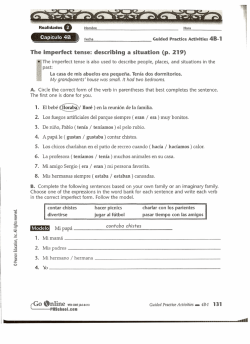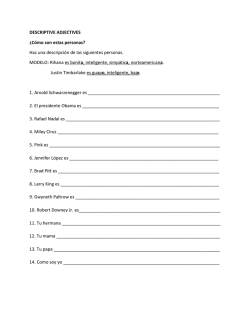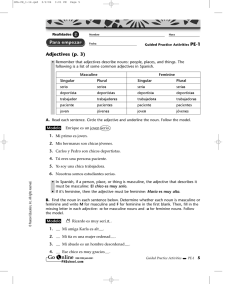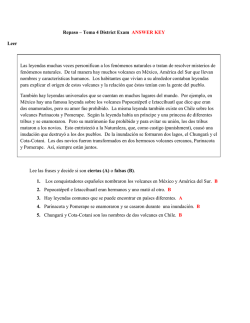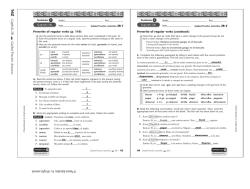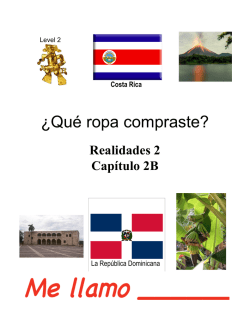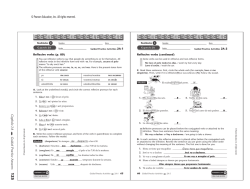
The imperfect tense: other uses (p. 248)
Guided Practice Activities
Fecha
5A-1
The imperfect tense: other uses (p. 248)
ffi
You can use the imperfect tense to tell what time it was (qué hora era), or what
the weather was like (qué tiempo hacía) when something happened.
'§$
Eran las cinco de la mañana cuando el huracán comenzó.
$#
{§l{i
lt
A.
wos five in the morning when the hurricone begon.
Read the following sentences and circle the correct verb in parentheses. Follow the
model.
lüt¡ñtltl
1.
ZQué
(
2.
ZQqihora era cuando terminó el noticiero?
(qtr9/
tiempo hacía cuando te levantaste?
/
do
¿
o
o
s<t)
C
o
6.
ZQué
/
§
ao
@
Fueron ) las tres de la tarde cuando comenzó el huracán.
tiempo hacía cuando comenzó la inundación?
/
Habia ) una tormenta de lluvia cuando comenzó Ia inundación.
¿Qué hora era cuando viste el incendio?
ZQué hora era cuando te acostaste?
( Eran
7.
ñ
-o
U=
o
Nevaba ) cuando salí de casa.
(fua / Eran ) Ia una de la tarde cuando vi el incendio.
:
I
E
casa?
¿Qué hora era cuando comenzó el huracán?
(Hubo
5.
Llovió ) mucho cuando me levanté.
iQué tiempo hacía cuando saliste de
( Eran
4.
/
Llovía
(Nevó
3.
Fueron ) las diez de la noche.
/
ZQué tiempo hacía cuando llegaste a casa?
( Hacía
8.
Era ) las nueve cuando me acosté.
/
}{acian ) mal tiempo cuando llegué a casa.
ZQué hora era cuando
( Eran
/
tu hermano volvió a casa?
Era ) las doce cuando mi hermano volvió a casa.
§nline
rco
\-PHSchool.
,,EBcoDEidd.oso4
com
Guided Practice Actit¡ities
- 5A1 149
Guided Practice Activities
5A-2
The imperfect tense: other uses (continued)
ffiThe imperfect tense
is also used to tell how a person was feeling when something
happened.
H*f¡
Anoche me acosté temprano porque tenía sueño.
i*¿§ Lost night I went to bed early becouse I wos sleepy.
ffi
B.
Look at the expressions in the word bank. Choose the expression that best completes
each sentence. Follow the model.
tristes
tenías sed
estaban
IVl ilill
tenía sueño
estaba cansado
estaban contentas
estaba asustada estábamos nerviosos tenía prisa
Queríamos comer algo porque nosotros
teníamos
hctmbre
1. Juanita gritó porque ella
2.
Después de rescatar al gato, Luisa y Victoria
3.
4.
5.
Tú tomaste mucha agua porque
Salí temprano porque yo
Cuando llegamos al edificio de apartamentos, nosotros
6. Cuando apagaron el incendio, el bombero
7. María se acostó temprano porque
8. Los paramédicos lloraban porque
sentences in the first column by choosing a phrase from the second
column. Write the letter of the appropriate phrase in the blank.
1.
Miguel estudiaba mucho y...
a. era una noche oscura.
2.
La mujer bajaba las escaleras
-.
lentamente porque...
b. después ellos tenían sed.
3.
Los niños hacían ejercicio todos los
días y...
4.
Nosotros oíamos la música de los
vecinos y...
5.
Tú te escondiste en el edificio
-.
porque...
15O
Guided Practice Actiaities
:ó
@
C. Complete the
:
5A-2
c.
ñ
oc
=
§
tenías miedo de las explosiones.
d. no quería salir con nosotros.
e. estábamos cansados de oírla.
§nline
rco
'-PHSchool.
¿
o
,,,EBcoDEjdd-0504
com
-.
o
=
=
a
(o
-
@
@
a
=
+
Realidades
Hora
Guided Practlce Activities
5A-3
The imperfect tense: other uses (continued)
i*¡:Remember that hubo and había are forms of haber. Both words mean "there was"
,iiiirlor "there were." Look at these rules:
l*ltUse hubo to say that an event (such as a fire) took place.
¡tI; Hubo un incendio ayer.
,iffiiUse había to describe a situation in the past.
;i¡ilii Había mucho humo en el edificio.
D.
Complete each sentence below with hubo or había.
-ci
o
¿
1.
un terremoto en esta ciudad.
2.
poca gente en las calles.
3.
muchos heridos.
4.
un incendio a las siete de la mañana.
5.
una inundación en la ciudad.
6.
muchas casas destruidas.
@
t
o)
.E
ü
C
E
o
-o
=
E. Choose the verb from the word bank that best completes each sentence. The first
one is done for you.
4
E
o
hubo
G
ao
@
estábamos gritaban
hubo
Recuerdo que (1.)
rco §nline
'-PHSchool.
qué hacer. Yo (6.)
,,EBcoDEidd.oso4
com
sabía
un terremoto en la ciudad. (2.)
tarde. Algunas personas (3.)
(s.)
eran
.
tenía
las seis de la
muy asustados. Yo no
Todos (4.)
mucho miedo.
Guided Practice Actiaities
- 5A-3 f 5l
Realidades
Guided Practice Activities
5A-4
(P. 25O)
The preterite of the verbs oír, Ieer, creer, and destruir
are irregular in the preterite. Here are their
#fi The verbs oír, leer, creer, and destruir
illipreterite forms.
yo
ol
leí
crel
destruí
rú
oíste
leíste
creÍste
destruiste
usted/éllella
oyo
Ieyó
creyó
destruyó
nosotros/nosotras
ormos
leímos
crelmos
destruimos
vosotros/vosotras
oísteis
leísteis
creísteis
destruisteis
ustedes/ellos/ellas
oyeron
leyeron
creyeron.
destruYeron
A.Readthesentencesbelowandlookattheunderlinedverbs.WriteanXineitherthe
tense of the underlined verb' The first
present or the Preterite column, according to the
one is done for You.
1.
Anoche oí un grito en la casa'
Present
Preterite
X
2. Ella oYe al locutor Por la radio'
3. ¿Tú crees que la gente se escaPó?
4. Nosotros creímos al rePortero'
5. El incendio destruyó el edificio de apartamentos'
6. Anoche Amalia leyó el artículo del terremoto'
B.
@
of the verb in parentheses'
ln the following sentences, circle the correct form
1.
Ayer tú ( oi
/@)
el noticiero en la radio'
Guided Practice Actirsities
t
5A-4
§
o
=
r
C
o
d-
o
2. Mis padres ( creyeron / creíste ) las noticias'
3. El huracán ( destruyó / desftai ) las casas'
4. Los bomberos ( oYó / oyeron ) la explosión'
5. El incendio ( destruyó / destruyeron ) los muebles'
152
€
@
=
5
n
(o
-
o
o
?
@
+
rGo
§nline ,,EBcoDEidd'osos
L-PHSchool.
com
© Copyright 2026
